The Minnesota Civil Liberties Union took my job discrimination case against the University of Minnesota. A lower federal court ruled in my favor, finding that you can’t discriminate against someone just because they are homosexual. The Regents appealed the decision to U.S. 8th Circuit Court of Appeals, who overruled the lower court, saying, “He has no right to foist his repugnant views on this institution of higher learning.”
—Michael McConnell
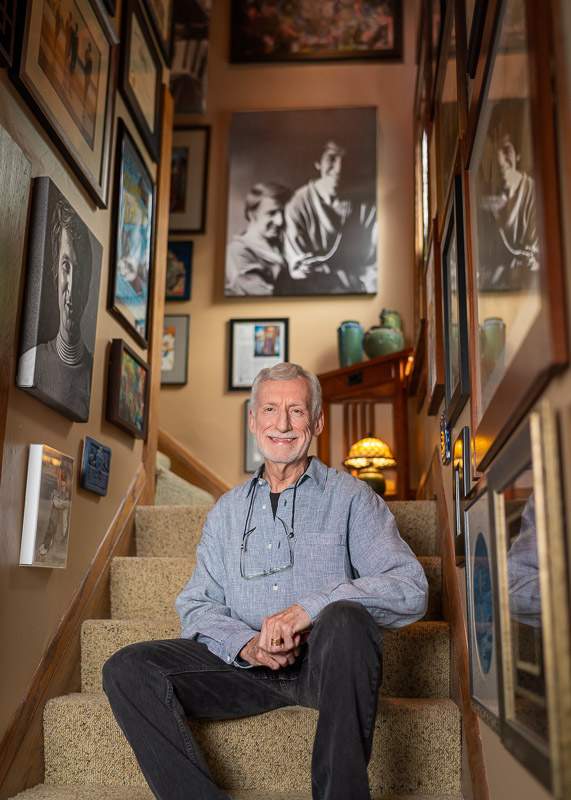
Oklahoma Childhood
I was born and raised in Norman, Oklahoma. My father was a barber who had a sixth grade education. Mom was a homemaker. She was educated and could have become a teacher if she had not decided to marry and raise a family. We were lower middle-class. My older siblings were depression-era kids, who experienced the Oklahoma dust bowl. Their outlook and upbringing were very different from my little sister and me, baby boomer brats born during the Second World War, growing up in the 1950s, when—as my father would say—we finally had more than a pot to piss in.
I knew I was gay by second grade. I remember standing in line holding my friend Arden’s hand and thinking, “Someday Arden and I will grow up and be just like Mommy and Daddy.” I heard all the fag and queer jokes, but even in junior high when it was abundantly clear I was whatever they were calling me, I was not afraid.
I had supportive role models in my family. The women – my maternal grandmother, mother, and sisters were extremely strong. One sister rode motorcycles and drove in stock car races–in the 1950s! I inherited their brains, though they often referred to me as the “smart one.” Yes, I did well in school, but I also had a life perspective which I got from them. I learned from them to use my brains for things I believed in.
From my dad, I inherited emotional connections and a tie to nature. He was a hunter, but he wasn’t redneck. He respected and loved nature. He raised 5,000 quail to release to the wild each year. We also had horses. I didn’t do team sports. I didn’t like competition and I still don’t—at least not the way men are taught, to beat others. Horses were my sport.
My family has always been this protective cocoon, and not just my parents and siblings. My cousins, aunts, uncles, second cousins twice removed — everyone held the attitude– “You mess with Michael, you are messing with us.” I think that is why I never felt fear, hatred, guilt or all those other things that so many other gay people my age went through. I understand those emotions because I saw them in my friends, but I did not experience them.
I was never in a closet, even in my teen years. I never hid anything or felt shame. That is what gave me the power to be a public gay person. That is what I meant when I said to my husband Jack in 1967, “We need to get married legally.” I was saying, “I am going to be public. If you want to do that with me, I’m here.”
Throughout my life I’ve heard my mother’s voice: “Not any better, but just as good as anyone else.” She also said, “I know you are so strong-willed. I just hope you decide to do the right thing.” Every time I’ve had a moral choice, I’ve heard that voice….
On that trip home Jack and I took to speak at the University of Oklahoma, my dad took me aside and told me:
“Michael, I have never understood you. Of all the kids, you are the one that remained a mystery, but I love you, you are my son. You stand up for your principles and you don’t back down. I really admire that.”
Meeting Jack
I started college at the University of Oklahoma as a pharmacy student. There I met my first ‘lover’ Bob, when I was 19. He introduced me to a gay world I had no idea existed. Within two years I followed him to the University of Kansas when he got a position there. I continued my pharmacy studies for three more years, before I realized the profession was not for me and switched to library science.
From Kansas, Bob and I moved to Michigan. We were together for four years. When we broke up, I returned to my parents’ home in Oklahoma. I was in a deep depression for nearly eight months. My family loved Bob and never really understood why we didn’t work out. My mother was the one who came into my room and said, “Michael this has got to end. You need to go out and make friends.”
I followed mom’s advice and began dating, but I was determined to wait until I finished my library degree and could make my own living before I committed to anyone again.
On Halloween 1966, I went to a gay party on a dairy farm outside of Norman. It was closeted and by invitation only. My best friend, Cruz Sanchez, who liked to play matchmaker, introduced me to a guy. He was 6’1”, thin and muscular, with a flattop crewcut.
This was the Beatles era. Men were growing their hair longer. I thought “No way. This is some straight guy out here for some gay sex.” I couldn’t imagine this would go anywhere.
I was obviously quite hesitant and Cruz could see that. It turns out that Cruz already knew him and pointedly said, “Michael, you may not know it, but you two are destined for each other.”
After we talked, off and on throughout the evening, Jack wanted to spend the night together. After that evening together I thought, “Nice guy but, so business like — not like any of the gay guys I knew.” I figured this was going to be one of those one-nighters.
Jack was charming. He had just gotten out of the Air Force and had finished his engineering degree. He kept inviting me out, to plays, movies and other outings. After a couple of months, I began to think… this guy is really pretty nice. My parents wanted to know what kind of family he came from. I giggled to myself, thinking, “That is so southern. Is his family proper enough for us?”
I invited him to our home. They loved him.
By January I could tell this was getting serious. But I still wanted to stick by my plan not to settle with anyone until I had my degree. In March, on Jack’s birthday, he proposed. I was ready with an answer I thought would delay things:
“I will commit on one condition: you will find a way for us to get legally married.”
He replied: “Looks like I am going to have to go to law school.”
I went back and told mom and dad. They were worried, thought the idea of us getting married sounded pretty dangerous.
In June, I moved out of my parents house. Jack and I lived in an apartment in Norman for a year while we finished our Master’s degrees. Then we moved to Lawrence, Kansas. He got a job as an Industrial Engineer at Dupont Corporation in Topeka. I took a two-year position as a Librarian at Park College in Kansas City, Missouri. We lived in Lawrence and commuted opposite directions.
Getting to Minneapolis
After about a year, Jack began applying to law schools. I didn’t think U of Kansas was good enough, but I didn’t want to live in Chicago where he had also applied.
I had a friend whose crazy Christian family was unaccepting when he came out. He went to live with his uncle who was head of student psychiatric services at the University of Minnesota. The move helped him gain a healthy view of himself. He told us Minneapolis was a good place to be gay in 1969. I suggested that Jack consider the law school in Minnesota. I told him I was tired of the heat and liked the idea of going somewhere cold.
Jack began at the University of Minnesota. We were separated while I finished my contract at Park College. In 1970 I got a job offer as head of cataloging for the University of Minnesota, St. Paul campus library. They were just beginning to automate their system. I had worked in technical services at the University of Oklahoma Libraries. In Kansas City I helped automate interlibrary access among University, public and private library collections. I was perfect for the job.
When Jack and I made public our intention to apply for a marriage license, the University revoked my contract.
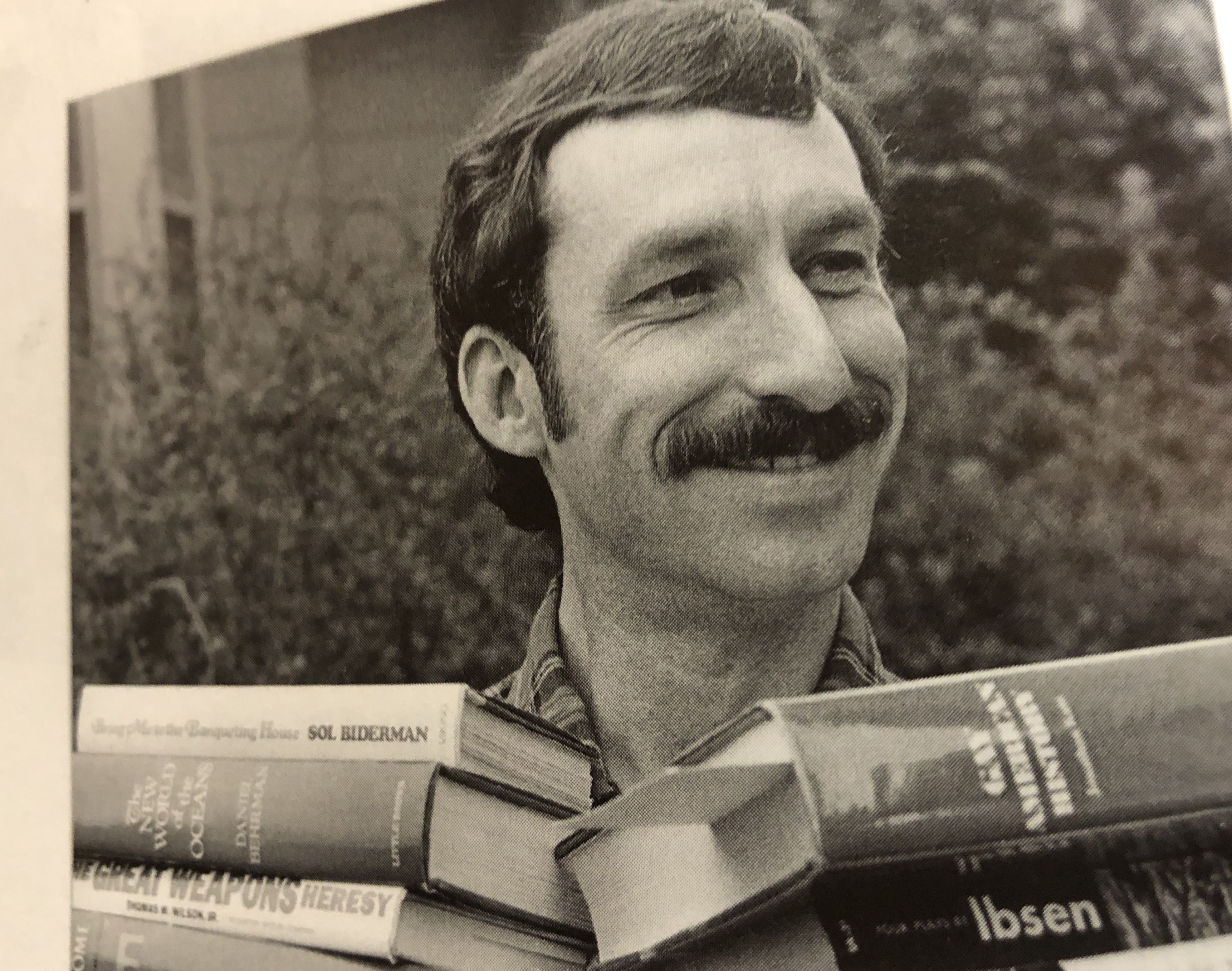
Photo by Peter Denzer
The Regents’ signature is usually a pro forma thing, but several Regents, disapproving my gay activism, refused to sign the contract. One said, “He should have just kept his mouth shut and stayed out of the public view….”
The Minnesota Civil Liberties Union took my job discrimination case. A lower federal court ruled in my favor, finding that you can’t discriminate against someone just because they are homosexual. The Regents appealed the decision to U.S. 8th Circuit Court of Appeals, who overruled the lower court, saying “He has no right to foist his repugnant views on this institution of higher learning.”
We appealed to the U.S. Supreme Court, but they refused to take the case. It took the University of Minnesota 42 years to recognize their wrong-doing. In 2012, President Eric Kaler issued a statement of public apology for the way the regents had treated me in 1970.
The 1971 Wedding Heard “Round the World.
We pursued our marriage license application in Hennepin County, appealing lower court decisions all the way to the United States Supreme Court, which again refused to hear our case. In 1972 they claimed the case lacked “substantial federal question”–their way of saying “not at this time.”
The Supreme Court re-addressed those arguments from our 1971 appeal in their 2015 ruling, declaring marriage equality a fundamental right. Now it is the law of the land.
In September 1971, as all this court action was going on, Jack and I went to Mankato and applied for a marriage license. We got the license and were legally married, with Jack using a gender-neutral name. We had a wedding party officiated by Methodist Minister, Roger Lynn.
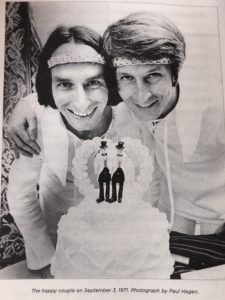 Photo by Paul Hagen
Photo by Paul Hagen
Blue Earth County took 47 years to actually record it. On September 18, 2018, the County District Court ruled: “The September 3, 1971 marriage of James Michael McConnell and Pat Lyn McConnell, a/k/a Richard John Baker has never been dissolved or annulled by judicial decree and no grounds currently exist on which to invalidate the marriage. The marriage is declared to be in all respects valid.” Soon after that ruling, our 1971 marriage was officially recorded, and certified copies were issued to us. It is now recorded in the Minnesota Official Marriage System [MOMS].
My mom was right. I am strong-willed and patient, (though this was a bit long even for me). I accept nothing less than full and absolute equality — even if it takes 47 years!
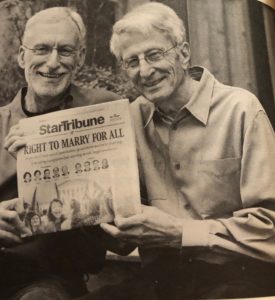
Photo by Angela Jimenez
After we married, the national press showed up. Walter Cronkite spoke about Jack’s election as student body president. Dave Moore had us on, and he aired a documentary on us. We were on the David Susskind Show in New York, Phil Donahue in Ohio, and Kennedy & Company in Chicago.
We began to push our “gay agenda” —full and absolute equality, no exceptions, no excuses. Gay relationships are about love and we wanted marriage equality. That has been our mantra from day one. We do not back down. We do not take crumbs from the table, we will not settle for a sandwich. We want the whole loaf. That got us into trouble from day one in those early days.
A Decade of Gay activism in Minneapolis, 1969-1980
Stonewall has become, in the historical record written by people on the East and West coasts, the beginning of modern militant gay movement. I don’t agree with that. Though Stonewall was a high-profile, violent, oppressive encounter with police in New York City and an extremely important event, there were other places where gays and lesbians powerfully confronted police and government officials. In San Francisco, Chicago, and Minneapolis, people were equally militant and resistant, getting arrested, serving time, fighting back.
And those activists had shoulders to stand on. Open gay and lesbian people picketed the White House in the 1950s. Homophile organizations like Mattachine Society, S.I.R., Daughters of Bilitis took significant actions in San Francisco, and other places, publicly signaling the beginning of a strong resistance.
In the early 1970s Minnesota was a powerhouse. A strong and growing group of gay men and lesbians were out and standing tall. Their voices and vision spoke loudly enough that they drew activists to the Twin Cities from New York, Boston, San Francisco, Dallas, Kansas City, Los Angeles, and Houston.
My husband Jack’s election as University of Minnesota’s student body president in 1971, was part of the reason Minneapolis became an important center. He was the first out gay president of any University’s student body. Considering the size of the student body [43,000 students,] that was a big deal. Jack was also the president of FREE: Fight Repression of Erotic Expression, one of the first gay campus organizations in the nation, founded just before the Stonewall riot.
And then there was our wedding, which got worldwide coverage.
During this time, the formation of gay groups was exploding everywhere. Across the country, activists were connecting. For a time, FREE tried to act as a clearing house for groups and actions across the country, but every week there were so many new ones it was impossible to keep up with them all.
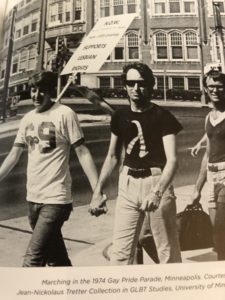
Photo in Tretter Collection, GLBT Studies, U of Minnesota Libraries. Michael has donated his papers to the collection.
Gay House in Minneapolis
One of the people who moved to Minneapolis because he saw what we were doing is John Preston. Preston worked with me to garner financial and social support to establish Gay House, the first agency providing a place for the community to meet outside of bars or the university.
We opened the doors of Gay House, just north of Franklin and Nicollet in Minneapolis, in the Spring of 1971. We had a drop-in center and provided peer counseling, referrals for professional services, and medical services. People from all backgrounds could get help with problems, talk about issues or just hang out. It was a place to find help not easily or comfortably addressed in general social service environments.
Gay House and the Los Angeles Gay Community Center were the first two GLBT social service agencies focused exclusively on the needs and support of the GLBT community. These two agencies became a model, quickly copied across the country. They also became incubators for the creation and growth of other groups addressing a range of needs: medical, faith, social service, politics, and gender-based issues.
We formed Gay House with seed money from churches. John was the one who raised that money and made those connections. He worked through the Minnesota Council of Churches which provided support. He even got a neighborhood Baptist Church near Gay House to contribute. I worked with him, making presentations on the work we were doing. Some wealthy, influential people showed up on occasion, to see what it was all about, and a few supported us quietly, behind the scenes. Preston was able to move comfortably in those circles.
I worked to get county social services, HCMC, Walk-in Counseling and many other traditional service organizations to work with Gay House. I was our representative on the Youth Services Coalition, providing sensitivity training for the staff of those 40 agencies. That collaboration allowed Gay House staff to attend training which would otherwise have been too expensive. We also led sensitivity training for police and some businesses.
Gay House was a progenitor of many other organizations that served LGBTQ folks directly. The first director of Gay House was a woman, Cindy Hanson. After about a year, women who were meeting at Gay House said, “We have had enough of you sexist men.” They decided to form the Lesbian Resource Center, a place for lesbians to manage their own needs.
I couldn’t have agreed more. A number of the men hanging around Gay House were full of shit, frankly. Many of them had the same sexist ideas about women as straight guys did. Jack and I stood with the women. We said to Cindy and other Gay House women leaders, “You know what you need to do. Just go do it!”
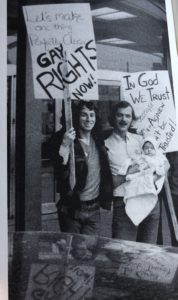
Michael with John Preston at Minneapolis Convention Center, 1973
FBI Infiltration
Also, in 1971, members of FREE hosted a national Gay conference on the West Bank in Dania Hall. A lot of New Yorkers showed up for this event. But, as with the Black liberation movement at that time, we found out later that we were infiltrated by the FBI who spread dissension and got people attacking one another, over issues like marriage, race and what it meant to work for civil rights for gays and lesbians. Though the conference could not be called a “success,” it did connect many of the then current national activists and allowed those connections to further solidify a national movement.
The Evolution of Movement Terminology
The first annual events were called Christopher Street Liberation Day, after Stonewall. It was Thom Higgins idea to call the Minneapolis event Gay Pride. When Jack was invited to the Chicago Christopher Liberation Day, he took Thom’s new terminology, with him and Chicago adopted it for their annual celebration. Within two years it was Gay Pride nationwide. It later became Gay and Lesbian Pride, eventually evolving to Pride.
Some people didn’t like the word gay. They called themselves homosexuals or homophiles. We used gay as an adjective to describe people who had a belief system. Women however, began to see gay as focused only on men. Thus, many began to use Gay and Lesbian. From there it expanded to include Bisexual and Transgender as the consciousness of people rose.
I refused the word homosexual, because I felt it defined me as a sexual being, not a human being, however others felt gay implied an overtone of sexuality that is sex negative. I think LGBTQ is fine. It took me a long time to come to terms with Queer. I’ve come to think it is up to this generation to decide what terms they need. Eventually we will come to a time when terminology won’t matter, but at my age, I suspect that is not going to be a world I will see.
Professional, workplace, constituent and political party caucuses.
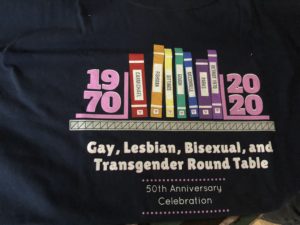
The American Library Association formed our Gay caucus in 1970. 50th year anniversary t-shirt design above. Other professional groups began to form gay caucuses around the same time. In 1973 the American Psychiatric Association took homosexuality off it’s “sick list.” Jack had input on that, working with Frank Kameny and others. Throughout the 1970s people worked within professional groups to push for non-discrimination charters and other protections.
When he was student body president, Jack worked with Universities across the country to forbid businesses who discriminated against gay people from recruiting on college campuses. He got Honeywell kicked off the University of Minnesota campus until they changed their policy. After that I think many companies quietly made changes.
Gays had become very active and highly influential in the DFL. By 1972 the DFL Gay Rights Caucus got marriage equality included in the party platform. That year, Wendell Anderson and Walter Mondale had apoplexy and repudiated the platform. In later years, even they came around to full equality.
Republican Governor Arne Carlson, was someone we worked with over the years. He was a strong supporter of Gay rights and marriage equality. There were other Republicans during those years who were willing to work with the community as well.
There were a surprising number of open minds all across the state.
Getting off the Public Stage
By 1980, Jack and I had became pariahs within the Minnesota gay community, because we stood for “full and absolute equality for ALL people, no exceptions, no excuses.” I can’t tell you how many people that pissed off. That is why Allan Spear and Steven Endean became the male spokespeople of the gay community by the late 1970s. They were willing to compromise.
Many gay men began to call us “lunatics, “crazies,” and “fringe” because we said no to a civil rights bill that gave us pieces, but denied us full equality. We saw Steve and Allan, and others as willing to negotiate our freedoms. We felt we were being used as a lighting rod, to raise money from gay people and then afford them second class status. So, in 1980 we got off the public stage, and started refusing to talk to the media.
Thom Higgins was one of the “fringe activists” who continued the fight after 1980. He helped organize a new activist organization called Target City Coalition, a refuge for the “radicals.” When Anita Bryant came to Des Moines, Iowa, WCCO TV went to cover her interview. Thom and a couple others from Target City rode down with them. Thom put a banana cream pie in Anita Bryant’s face and ended her career.
When the Catholic Church went to the legislature to lobby against LGBT rights another member of Target City put a pie in the Archbishop’s face. Resistance to a lack of action on legislation and hateful attacks from the right would not stand.
Other “fringe” activists included Tim Campbell and Phil Willkie. Many used unconventional means to draw attention to important issues or used their influence to get action out of political bodies locally. It all added up and built a remarkably strong presence that would endure far into the future.
It took 22 years for statewide gay rights legislation to come to Minnesota. During much of that time, the DFL was in power in all branches of government. With so many active gay and lesbian members, party activists, financial supporters, and even elected officials, that is a disgrace in my mind. Considering how quickly Minneapolis enacted protections for transgender folks in 1975 [the first in the country] as a part of civil rights protections for gays and lesbians, I still find it hard to understand that nearly a generation lapsed before statewide rights became a reality.
By 1980, Minneapolis had long had protections for us as gay citizens. Jack and I were legally married, and we had purchased our own home. We became involved in the Lyndale neighborhood, working to keep it affordable and sustainable, not gentrifying, but focusing on helping homeowners make needed repairs and dealing with negative social issues.
We also focused on our professional careers. We felt the new generation of activists would find their way to the future they wanted. Time for us to help quietly behind the scenes and stay off the public stage.
Advocating for Diversity in Public Libraries.
Jack had said in 1970 when I lost my job with the university, “This will turn out to be a blessing in disguise.” I can’t honestly say I believed him at that moment. I was terrified that all the education, job experience and effort I had put into my career was for naught.
It turned out that he was right. When the University kicked me out, a new door opened for me in the Hennepin County Library system. When I began, most suburban communities had separate libraries. During my tenure they incorporated into a large, new automated system of 26 libraries with new buildings, collections, and staff.
After great success in my early career, I began to despair about the fact that the staff was mostly white, especially as the suburban communities became more racially and ethnically diverse. When we finally got a Black library director, I began talking to him about diversity in the system. I quickly discovered that we had to actively recruit people. We couldn’t depend on others to do it for us. And we had to be willing to go outside of Minnesota and convince people to come here.
Saad Samatar was at the University of Wisconsin, Madison, working in the Library’s Business Department. I began talking with him on the phone when the new Brookdale Regional Library was still under construction. I convinced him, over the course of 18 months, that the Brookdale library would be a great place for him to work. He has advanced and become part of the system’s management team.
I have another friend who is Ethiopian — Guthema Roba — who originally worked as a librarian in the parliament in Addis Ababa. When the government changed, Guthema chose not to be a part of the ruling political party. He was tortured. When he finally got free and was able to escape the country, he had to leave his family behind. He ended up here in Minnesota.
He visited the Brookdale Library and asked to work as a volunteer. When I first met him, he was wracked with trauma. He was both physically and mentally overwrought. I supported him as he worked to get past these barriers and recover. Over time, he was able to get his wife out of Ethiopia with the help of attorneys and others, but they were unable to get his son out. Guthema assured me he was safe with other family members who would raise him as their own.
While that multi-year fight was taking place, I showed him how the Hennepin County Library system worked. He got hired to work as an information professional at the Golden Valley Library. He is greatly loved by the community he serves. In more recent years he has published two books of poetry. Quite an amazing man.
What I learned from these specific examples is: if we are going to get diversity in our system, every person has to commit to the goal. You have to recruit people. And once they are here, you have to support them, help them make the adjustment and find their place. Managers need to look at people’s skills, abilities and capacities, not the irrelevant things. You have to go that extra step. On a broader scope, white people have to understand diversity is important for all of us. It’s what makes us strong and interesting as a people. Our diversity is our strength.
Full and Absolute Equality for ALL People. No Exceptions. No Excuses.
I am done with greedy, mean, old white men running the world. And as an older white man myself, I am comfortable saying that. I believe women, who are generally socialized to be more cooperative and collaborative, need to be in more leadership roles. I know that is a broad brush, but in my experience, that’s the way it is.
Working in a female-dominated profession has only deepened my perspective on the competitive male model pushed by our society. My female colleagues showed me the problems with a “competitive business” mentality, and the negative realities of outright sexism. I have worked with many brilliant women who were not promoted to important leadership roles and who would have contributed so much to excellence in their respective areas
In many library systems around the country, who were the highest level managers and directors for so many years? Men—many of them complete and utter dunces, in my humble opinion. Of course there are many great men in the profession, but by and large….
It’s time for change. I think people are starting to figure that out, but I don’t know if we have enough time, ecologically speaking. If women had had a more powerful role earlier, we might have had a chance. And if we had embraced the belief systems of Native peoples, in terms of our balance with nature, we would be in a very different place. So many other areas of human endeavor would be richer and more successful if diverse voices were heard and respected.
Oklahoma territory was the place where Native people were herded during the Trail of Tears. My best friend was half Choctaw. I met his grandfather when I was in elementary school. He had a profound impact on me.
When I was little, my next door neighbor, an older White woman, told me about seeing Native people coming into the state when she was a girl. At the time of our conversation– the early 1950s — oil companies had taken over in Oklahoma and many Native peoples had been displaced or even murdered As a child I heard all this “romantic” stuff about cowboys and Indians. It was many decades later, after leaving Oklahoma, that I learned of the brutal stealing of native lands and resources. I now see it as a genocide. The White history they taught us as children was lies. I resent those lies.
I also didn’t know I grew up in a “sundown town” — no Blacks in town after sundown. I never saw this enforced or even heard it spoken of in conversation. My father hired Black people in his business. He would drop off catfish he caught for his Black friends in Purcell, a small town south of Norman with a significant Black community. There were Black students at the University of Oklahoma, but in my high school there was not a single African-American person. I was so naive and ignorant that it never dawned on me to ask why that was.
Today the future is terrifying for the planet. For the GLBTQ community, civil rights will come as long as people continue to come out and stand up for themselves. We need to be there for young people finding their way, and for elders for whom years of oppression eroded the social supports they need in their old age.
We need to have a big picture even if we start small, in our own communities, to get to that bigger goal of equality.
I know justice can take time. We thought we would have same-sex marriage throughout the country by 1980! That’s a long wait. Oppressed people can wait only so long for justice, especially in these rapidly changing times. Stand up! Move forward NOW!
We celebrate our 53rd anniversary of commitment in 2019, and our 48th year of legal marriage. As I told Jack on a number of occasions over the years, “We jerked them 45 years into the future. It took them a while to catch up.
Today our focus is on supporting young people. We want them to understand the past so they can build their own future and secure their rights with a clear sense of their history.
Through 50 years of activism, the two guiding principles of our life as a couple have remained true: 1.Love is the most powerful force in the universe. It can and does transform everything. 2. Full and absolute equality for ALL people. No exceptions. No excuses.
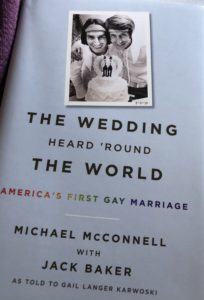
All black and white photos taken from The Wedding Heard ‘Round the World University of Minnesota Press, 2016.

